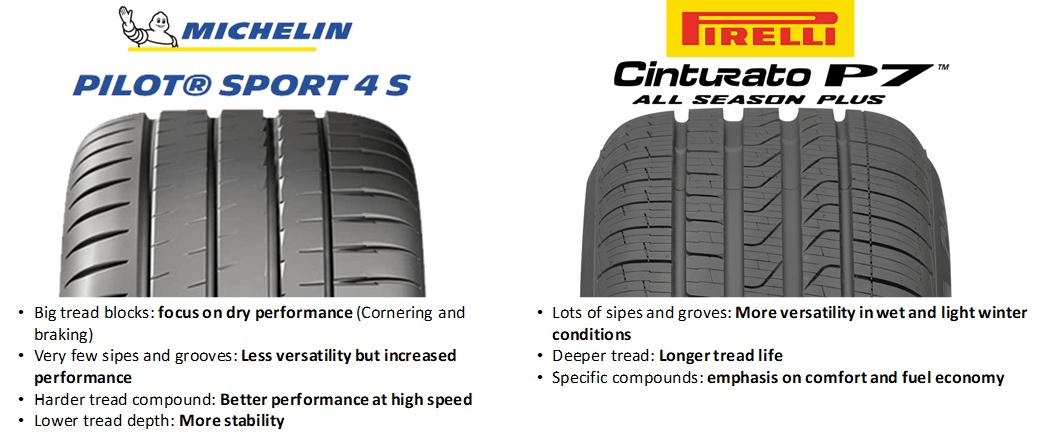

The difference between all-season, all-weather and summer tires
We generally use the terms “winter tires” and “summer tires” to differentiate tire models and their use. Although winter tires really do stand in a category of their own, all-weather vs all-season vs summer tires are easier to confuse.
Blackcircles Canada compares these three types of tires to help you make sense of things, and choose which is best to suit your needs.
What are all-season tires?
The tire we call a “summer tire”, is generally –and most often- actually an all-season tire. It is a versatile tire that offers good performance in the spring and the fall, and that has a higher tolerance for colder temperatures.
However, the term “all-season” is not necessarily adequate, in the sense that it is not necessarily ideal for every season. This depends greatly on where you live; but these tires are generally not suited for harsh Canadian winters. That is also why they are prohibited in the province of Quebec from December 1st to March 15th. Even if other provinces have not followed suit and issued the same recommendations, they are still not recommended during the colder months in conditions such as ice or snow.
In fact, the materials used to make these tires generally lose their flexibility under 7 °C. This not only means that they become less performant in these temperatures, it also means they can become dangerous. All-season tires are great for slight variations in temperature, but they must be avoided as much as possible when temperatures drop below 7 °C.
In the way they are designed, all-season tires are comprised of a versatile tire tread that is rather smooth, and they generally offer lower rolling resistance, in an effort to also reduce fuel consumption.
All in all, they are versatile tires that are suitable for most cars, from spring to fall. This means that in reality, they are 3-season tires. In countries where the climate is warmer, they can be considered all-season tires, although that is not the case here in Canada.

What are all-weather tires?
All-weather tires are the real 4-season tires; they are also generally referred to as such. They are not as smooth as all-season tires are and they have sipes that allow for a better grip on snow and ice.
We recognize these tires by the three-peak mountain snowflake symbol, which signifies that it is also suitable for winter conditions. If your vehicle is registered in the province of Quebec, these tires can be used in every season, and is considered safe.
In fact, its rubber compound integrates more flexible materials that allow them to maintain their integrity in temperatures below 7 °C. They offer good versatility and can also generally be used year round.


However, in harsher winter conditions like intense cold, abundant snow or ice covered roads, it is always preferable to opt for a winter tire, since it is specially made for these types of weather conditions.
What are summer tires?
We referred to this briefly in the introduction: if we call all-season tires summer tires, then what are actual summer tires? In truth, they are tires that are really geared towards performance, so they must be particularly efficient in the summer.
They are much less versatile than all-weather tires, but they offer superior performance like:
- More precise turns
- Shorter braking distances
- Greater handling on dry or wet roads
If you want to take advantage of the warmer season to have fun on the road with performant tires, then summer tires are made for you. However, they will lose their flexibility much faster, as temperatures drop. Under 7 °C, these tires become very hard and resist very poorly to aquaplaning.
If that is your objective, then these tires will in fact give you optimal handling and a great driving experience in the summer. But you should know that performance has its price, as they are also the most expensive tires.

How do these different types of tires compare?
If we compare all-weather tires vs all-season tires vs summer tires, it is easy to see that they are not all suitable in the same weather conditions. Here is a summary that will help you see the differences for yourself:
| Properties | Summer tires | All-season tires | All-weather tires |
|---|---|---|---|
| Price | High | Low | Average |
| Versatility | Low | Average | High |
| Performance during the summer | Excellent | Good | Average |
| Performance spring through fall | Average | Good | Good |
| Performance in the winter | Nil | Low | Average |
In short: the summer tire is the only one that can truly offer great performance in the summer. The all-weather tire offers average performance in most weather conditions; it has a tendency to wear down quickly in the summer and the winter, even if it is adapted to those conditions.
When it comes to the all-season tire, it is more versatile than the summer tire and more performant than the all-weather tire in warmer temperatures, although it is not suitable for the winter. It is also, generally, the least expensive, though prices vary according to model and brand.
FAQ about all-weather vs summer tires
As seen above, summer tires are first and foremost focused on performance. Are you hesitating between all-weather and all-season tires? We will answer your questions.
Are all-weather tires better than all-season tires?
All-weather tires are, without a doubt, the most versatile of the two, especially given that all-season tires are not suitable for safe winter driving. However, all-season tires generally offer things such as greater performance in the summer, a more quiet driving experience, a lower rolling resistance, etc.
All-weather tires are thus better than all-season tires if you do not want to change your tires in the winter. However, they also have a slightly shorter lifespan than all-season tires.
Are all-weather tires worth it?
All-weather tires can be worth it. One of the reasons for this is that it may be cheaper to purchase only one set of tires, and also because you will save on tire changing fees twice a year. However, the tire tread on these tires generally has a shorter lifespan. This means that they are the perfect tire for you if you do not use your car much, if you don’t go out much during the winter, or if you live in a place where the climate is warmer.
Choosing the proper tire for your needs and your vehicle
You have most likely understood that the choice between all-weather tires vs all-season tires vs summer tires really depends on your needs. As summer tires are truly destined for performance, they are perfect for vehicles such as:
- Sports cars
- High-end cars
- Luxury cars
They are also perfectly suited for both touring cars and SUVs. Now, between summer tires or all-season tires, the choice will depend on what type of driving experience you are looking for and what type of vehicle you have. All-season tires are definitely more versatile, but the summer tire will allow you to take full advantage of what a sports car has to offer.
All-season tires are the perfect tires for you if what you are looking for is a less expensive tire, or a tire that is quieter on the road (depending on model). This type of tire is suitable for sedans, SUVs, trucks and vans, depending on model. Finally, an all-season tire that is also winter certified will be suitable for those who:
- Don’t go out much during the winter
- Don’t put much mileage on their car
- Live in the city
- Often change climates (like going to Florida for the winter, for example)
For even more advice on how to select the perfect set of tires for you, do not hesitate to contact our tire specialists online, at blackcircles!


